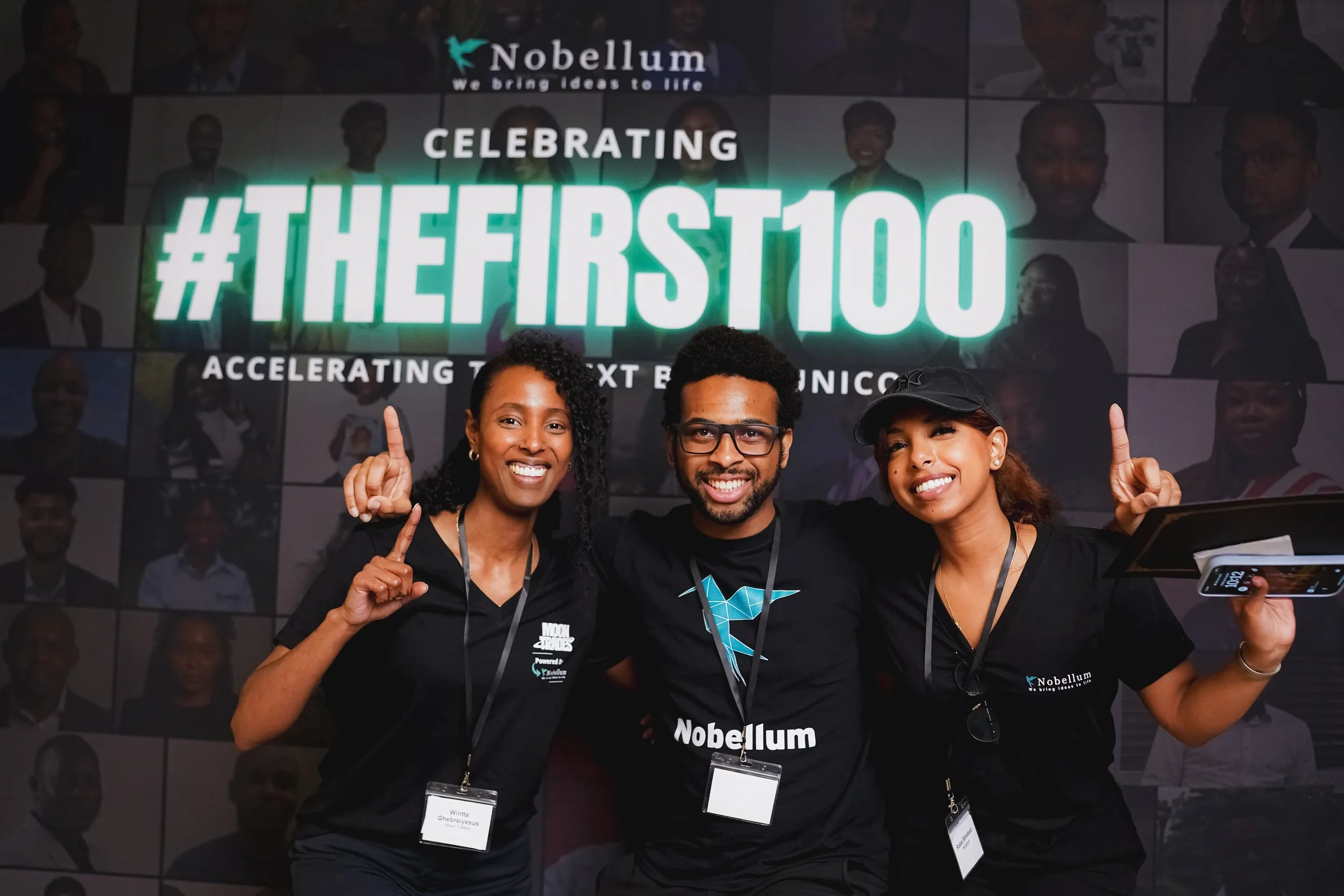Nobellum has crossed its ambitious five-year mandate of launching 100 Black-led STEM businesses. Founder Melisa Ellis explains the blueprint—community, capital, and courage.
When AfroToronto first spoke with Nobellum founder Melisa Ellis in 2022, the goal sounded both urgent and audacious: to launch 100 Black-owned businesses in STEM by 2025, while building an ecosystem that keeps dollars circulating within the community. Three years later, the milestone is real. The headline Melisa wants you to remember is simple and powerful: “It’s possible.” The story behind that phrase serves as a blueprint for how Black innovators, in Toronto and across the diaspora, can claim a space in an industrial revolution defined by AI, automation, clean tech, and digital transformation.
Ellis didn’t begin with a number. She began with a problem. While managing a multi-million-dollar robotics and digital transformation project, she looked around and could not find a single Black-owned vendor on the job. The gap was glaring. If we’re not on the playing field, she reasoned, we don’t capture the contracts, the skills, or the wealth that follow. Nobellum was created to change that reality—by cultivating founders, connecting them to capital and partners, and fostering a culture of collaboration that transitions solo strivers into resilient teams.
From problem to platform
Ellis and her co-founders, Catherine Lawrence and Malcolm Wright, built Nobellum as a social enterprise that blends community mission with business discipline. The result is a program that has launched 100 Black-led STEM ventures and, according to Ellis, helped its portfolio generate roughly $22 million in revenue, create 268 jobs, and raise more than $4.5 million in venture and angel funding. Crucially, most of that progress happened with less than 15% government funding. That choice—designing for sustainability rather than dependency—shaped Nobellum’s culture and partnerships.
Where the 100 are building
The founders span Canada and the diaspora. About sixty are based across the country, including Montreal and British Columbia, with pathways into local innovation hubs. Beyond Canada, cohorts include entrepreneurs in the Caribbean, particularly Jamaica, and across Africa, notably Nigeria and South Africa. The sector mix reflects real-world problems and future-ready markets, including agri-health, AI-driven services, life sciences, materials innovation, and clean tech.

There are bold ideas in the mix. Ellis points to founders exploring compounds derived from orange peels to address epilepsy symptoms, and another replacing petroleum inputs with canola-seed derivatives to supply construction products, including a federal procurement win on Canada’s West Coast and in Nunavut. These are founder claims and early wins, yet they hint at how culturally rooted perspectives can produce novel solutions to long-standing challenges.
Breaking the solo-founder trap
Ellis is candid about a pattern she sees often—talented Black entrepreneurs trying to do everything alone. Some of that is about protection and past harm. The consequence is familiar: under-sharing, under-selling, and burning savings before securing product-market fit. Nobellum pushes a different rhythm. Founders are dropped into community. They attend cohort-based training, gain sponsored access to major tech conferences, and get intentional introductions to prospective co-founders, advisors, and early customers. The aim is to normalize collaboration and build teams that can actually scale.
Funding pathways that fit the business
Conversations about capital can flatten into one-size-fits-all advice. Ellis argues for fit-for-purpose financing, and the program supports this with a structured approach and strategic partners.
Before the bullets, here’s the context. Nobellum coaches founders to identify their growth model first, then align it with the right money. Traditional services or CPG ventures rarely align with venture timelines. Hyper-scalers need institutional fuel. Social enterprises should explore blended finance and durable reserves. With that frame, the pathway becomes practical.
-
Traditional and services: Angels and patient capital aligned to long-term growth. Sustainable cash flow beats aggressive dilution.
-
Venture scale: If the market truly supports rapid expansion, target VCs or sector-specific funds prepared for speed and scale.
-
Social enterprise: Build endowments and develop partnerships with development banks and mission-aligned institutions to keep the lights on through cycles. Nobellum modelled this with a University of Toronto endowment that unlocked matching dollars and over $200,000 in non-dilutive grants for founders.
-
Bootstrap, but smart: Leverage co-founders’ time and networks. Protect your runway. Pay for expertise strategically, not reflexively.
Partners that move the needle
Ecosystems thrive when partners do more than cheer from the sidelines. Nobellum has stitched together a set of relationships that remove real barriers.
First, the accelerator’s cohort model brings in expert instructors and program resources that would otherwise be out of reach. Then, the network opens doors to IP protection, capital, and space. The following partners, among others, create tangible value for founders.
-
Intellectual property: Through IP Ontario (IPON), founders can access advisors and an estimated 80% subsidy for trademarks and patents.
-
Capital connections: Black Opportunity Fund and Export Development Canada for financing options. BKR Capital and The Firehood for equity investment—some founders have secured up to $200,000 through The Firehood.
-
Workspaces and community: New partnerships with Loft provide seven remote offices across the GTA where founders can focus, host clients, and meet peers.
-
The Black Innovation Zone: A coalition of 30-plus organizations that shows up at major conferences like Collision, Elevate, and Web Summit. With sponsored tickets often valued at around $1,500, more than 17,000 entrepreneurs have now entered rooms where deals and ideas circulate.
Going global, on purpose
The Catalyst for Entrepreneurship and Innovation (CEI)—nicknamed “C”—is Nobellum’s international pillar. Think of it as an on-ramp to global markets that reframes our perspective on the Caribbean and Africa. C-Jamaica, developed in collaboration with the Development Bank of Jamaica, brought a delegation of fund managers overseeing approximately $550 million to meet with founders on the island. One entrepreneur who began the program seeking angel investors for $250,000 left with a redesigned digital and franchise model, as well as investor advice to aim for $2 million. Next up is C-Africa, with the same mix of market exposure, investor dialogue, and practical coaching.
Women in STEM and the power of the ask
Ellis’s own journey into tech started after a career pivot. When she went back to school for software development and network engineering at Sheridan, she saw many women excelling—though few were Black. On funding, her challenge to women founders is direct. Ask for what you need, clearly and confidently. The shift from tentative to intentional asks can change the room. Courage is a muscle that grows with use.
What the accelerator actually gives founders
It is easy to romanticize entrepreneurship. Nobellum pairs inspiration with infrastructure. Founders can join a general business cohort or delve into specialized streams, such as AI and IP. They gain access to software, AI training, expert-led workshops, investor preparation, sponsored conference tickets, and strategic introductions that lead to board seats, advisory roles, and first contracts. Ellis estimates that the bundled value of tools, training, access, and perks averages about $200,000 per founder. The signal is clear—ambition backed by real resources.
What’s next
If the first chapter was about proving possibility, the next chapter is about a durable scale. Nobellum is expanding its international pillars, deepening local partnerships, and continuing to convene a unified voice across the Black innovation community. The accelerator will continue to refine its mix of endowment funding, corporate partnerships, and private investment, enabling founders to build on the gains of the past three years without waiting on program cycles or shifting political tides.
Practical takeaways for founders
Strong storytelling helps readers scan. Here are grounded lessons drawn from Ellis’s playbook and the conversation above. Before you dive in, remember that each point sits inside a larger narrative of community-centred, revenue-aware building.
- Find co-founders early. Share the vision, not just the workload. Diverse skill sets speed validation and reduce burn.
- Protect your runway. Bootstrap with discipline. Prioritize customer discovery and paid pilots before large build costs.
- Align capital to your model. Don’t chase VC if you’re building a solid services firm. Do chase it if your market and product truly warrant speed.
- Own your IP. Meet with an IP advisor before you pitch. File what matters.
- Step into big rooms. Conferences and trade missions are multipliers when you arrive prepared.
- Ask with intention. Be specific about the number, the use of funds, and the timeline. Then make the ask.
Essential takeaways
The promise of Nobellum was never only about hitting a round number. It was about building a self-respecting economy of talent, suppliers, and founders who show up when major contracts are on the table. Melisa Ellis and her team turned a gap they experienced firsthand into an operating system that delivers training, capital pathways, IP protection, and global market access. The hundred-venture milestone is proof of concept. The real success is the scaffolding that remains for those who will launch next.
For AfroToronto’s readers across the GTA and the diaspora, this story lands close to home. It speaks to the power of organized community, the reality that sustainable models outlast funding cycles, and the confidence to ask for what our ideas deserve. From Toronto to Kingston, Lagos, and back again, Nobellum’s journey suggests a future where Black innovators are at the centre of the technological and economic transformation shaping our world—building boldly, and building together.
Learn More About Nobellum
Nobellum is a female-led social and technology enterprise dedicated to empowering the Black business ecosystem. With a mission to support innovators in launching and scaling sustainable ventures, Nobellum combines community-based training, global networking opportunities, and capital access to drive long-term impact.
-
Website: www.nobellum.com
-
Programs: Cohort-based accelerator training, global initiatives such as CEI (Catalyst for Entrepreneurship and Innovation), and endowment-backed grant funding in partnership with institutions like the University of Toronto.
-
Impact: Over 100 Black-led STEM ventures launched, $22M in portfolio revenue, 268 jobs created, and millions raised in venture and angel funding.
-
Global Reach: Operations in Canada, the Caribbean, and Africa, with a vision to expand sustainable Black innovation ecosystems worldwide.
By building a framework that goes beyond government cycles and short-term grants, Nobellum stands as a transformative model for economic empowerment and systemic change.







Comments powered by CComment